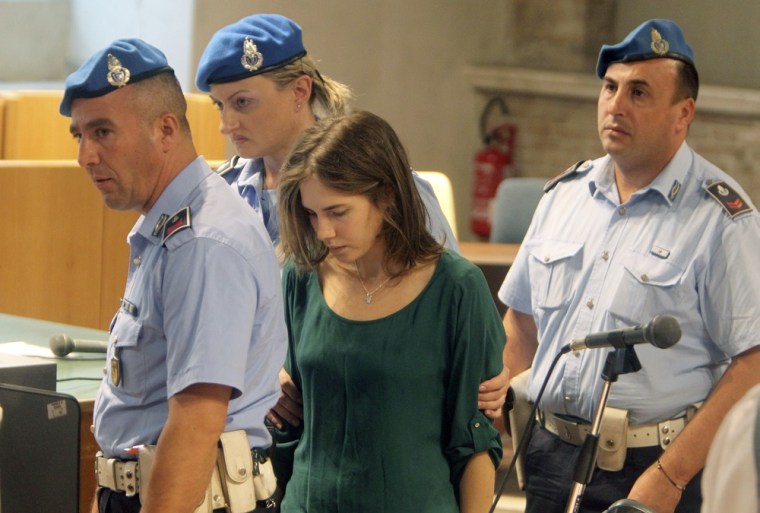An American student jailed for the murder of her English housemate hopes to win an appeal against her conviction after an Italian judge rejected prosecution calls for a second review of crucial evidence that two experts have undermined, her family said on Wednesday.
Amanda Knox, 24, is appealing against her conviction for the 2007 killing of language student Meredith Kercher at their rented house in the Italian town of Perugia, central Italy.
Appeal court judge Claudio Pratillo Hellmann turned down a prosecution request to review forensic evidence used to convict Knox after an independent report found it to be unreliable.
"They have no case, there is no case left and I am very hopeful that by the end of the month we will get to bring Amanda home," her father Curt Knox told CNN outside court.
'Happy and hopeful'
His daughter is "happy and hopeful" that she will be released from prison soon, he said in comments reported by Britain's Daily Telegraph newspaper.
One of the two prosecutors opposing Knox's bid to overturn her conviction was quoted by the Daily Mail newspaper as saying that there was an "ill wind blowing in this case."
Prosecutor Manuela Comodi said she could envisage Knox and her former Italian boyfriend Raffaele Sollecito, also convicted of Kercher's murder, being cleared by the appeal court.
"The judge and his assistant are clearly against us. I can see both Knox and Sollecito being freed which will be a shame as they are both involved," Comodi was quoted as saying in the Daily Mail.
Knox and Sollecito and Ivorian Rudy Guede were jailed in 2009 after what judges concluded was a frenzied sex game that spiraled out of control.
Both deny wrongdoing and are appealing the lower court verdict.
The decision to deny more DNA testing was a blow to the prosecution, which had sought to counter the results of a court-ordered independent review that harshly criticized how DNA evidence was used in the case.
Without a clear motive or convincing witnesses, the DNA evidence is crucial, and much of the appeals outcome hinges on it.
The court presided over by Judge Claudio Pratillo Hellmann said closing arguments to begin on Sept. 23, with the prosecution going first, followed by civil plaintiffs and the defense.
In the first trial, prosecutors maintained that Knox's DNA was found on the handle of a kitchen knife believed to be the murder weapon, and that Kercher's DNA was found on the blade.
They said Sollecito's DNA was on the clasp of Kercher's bra as part of a mixed trace that also included the victim's genetic profile.

Unreliable
The appeals court ordered an independent review, which found that much of that evidence was unreliable and possibly contaminated.
The review was at the center of several fiercely debated hearings in the Perugia courtroom, with police defending their investigation.
The TODAY show reported Wednesday that the court was shown pictures of the refrigerator, filled with food, in the house where Kercher died, taken weeks after the murder.
The court was told that police stored biological evidence in the refrigerator and there was a question about whether the food — a possible source of DNA contamination — had been removed first.
"This is a strange way of [collecting] evidence," defense forensic expert Adriano Tagliabracci told TODAY.
Pratillo Hellmann said the discussion about the DNA evidence had been thorough enough for the court to form an opinion.
New testing would be "superfluous," he said, rejecting the request made earlier in the day by Prosecutor Manuela Comodi.
The court also rejected another prosecution request to put back on the stand a witness who had previously testified that his brother, a fugitive, had killed Kercher during a botched burglary.
The witness, a jailed Naples mobster called Luciano Aviello, announced he wanted to retract and was questioned by Comodi in prison in July.
The court ruled that transcriptions of that questioning would suffice.